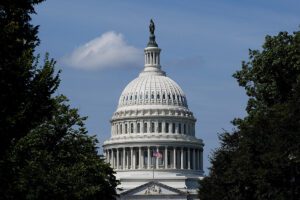WASHINGTON (OSV News) – A bill to ban the use of capital punishment by the federal government was reintroduced in Congress, where it faces steep odds for passage.
Sen. Dick Durbin, D-Ill., who is also Senate majority whip and chair of the Senate Judiciary Committee; and Rep. Ayanna Pressley, D-Mass., reintroduced July 13 their bill, the Federal Death Penalty Prohibition Act, bicameral legislation that would prohibit the use of the death penalty at the federal level and require re-sentencing for those individuals currently on death row.

In a statement, Durbin called the death penalty “deeply flawed and disproportionately imposed on Black and Brown and low-income people in America.”
“Our bill follows the lead of 23 states, including Illinois, by finally putting an end to this failed and unjust policy at the federal level,” Durbin said. “I thank Congresswoman Pressley and our colleagues who are joining us in this effort.”
In her own statement, Pressley said, “State-sanctioned murder is not justice, and it’s time we abolish the cruel, racist, and fundamentally flawed death penalty that has been weaponized against Black, brown and low-income people for far too long.”
“With momentum growing across the country, Congress must follow suit and pass our bill to end the federal death penalty once and for all,” Pressley said. “I’m grateful to Chairman Durbin and our movement partners for their continued partnership and commitment to getting this done.”
The 2023 version of the legislation, which was originally introduced by the same lawmakers in 2019 after the U.S. Department of Justice’s announcement during the Trump administration that it would resume the use of the death penalty.
A spokesperson for the U.S. bishop’s conference told OSV News the group plans to support the bill. The conference also supported previous versions of the legislation.
Krisanne Vaillancourt Murphy, executive director of Catholic Mobilizing Network, a national Catholic organization working to end the death penalty and one of the groups supporting the bill, said in a statement that if passed, the bill “would eradicate the flawed and morally bankrupt federal death penalty system.”
“As Catholics who believe in the inviolability of human dignity, we understand that we cannot build a culture of life with a federal government that can put people to death,” she said. “This legislation opens up the possibility for more healing and life-affirming forms of justice.”
Vaillancourt Murphy said it was “this very month three years ago that the Trump administration broke a 17-year hiatus from federal executions and took the life of Daniel Lewis Lee.”
“In the six months that followed, the administration went on to kill a dozen more people, disregarding ample evidence that the federal death penalty system is racially biased, arbitrary, and fraught with errors,” she said. “This shocking backslide into executions tarnished any claim the administration made to be ‘pro-life.'”
“There is little doubt that capital punishment will one day be abolished in the United States, but time is of the essence,” Vaillancourt Murphy continued. “As long as executions are legal, human lives are on the line. It’s time for Congress to exert the political will and moral courage needed to abolish the federal death penalty once and for all.”
Although President Joe Biden promised as a candidate that he would end the federal death penalty, the bill faces steep odds in Congress, where a Republican-controlled House is likely to oppose it. But the bill also faces difficult odds in the Democratically-controlled Senate, where it would need the support of 60 senators to clear the upper chamber’s filibuster rule.

